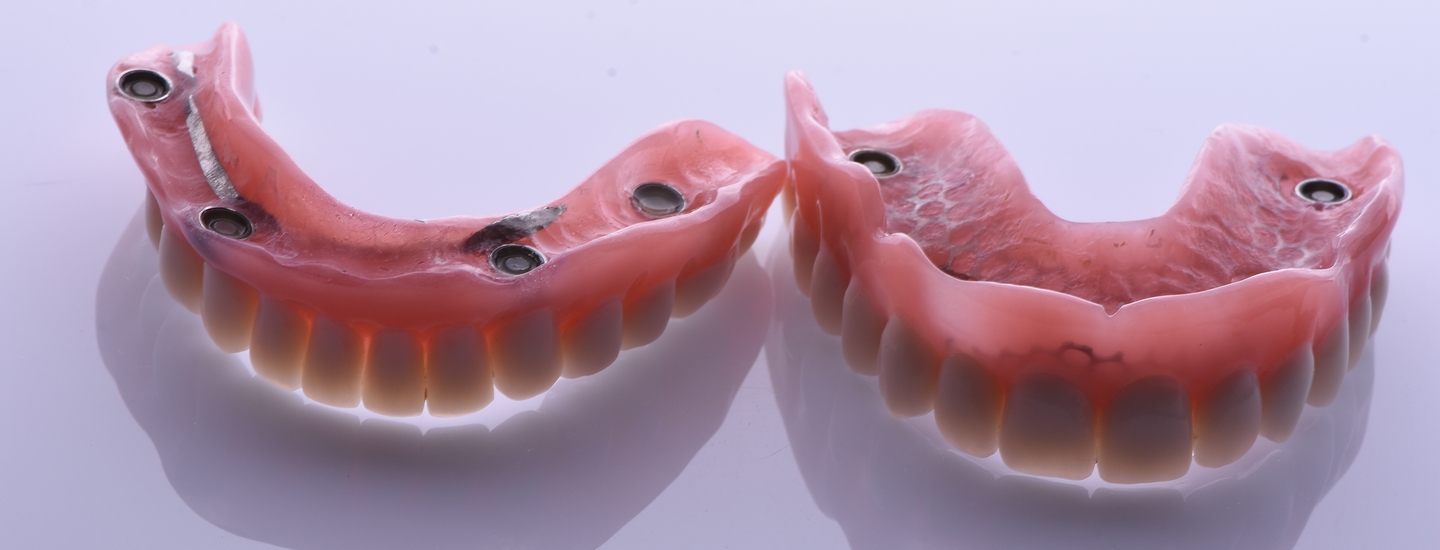

Oral health plays a crucial role in overall wellness and quality of life. Complete dentures (also known as full dentures) are among the most common treatment options for individuals who have lost all their natural teeth. However, they are not the only solution. Alternative treatments such as implant-supported fixed dentures, removable and fixed partial dentures, implant-supported overdentures (snap-on dentures), and the All-on-Four system (4-implant fixed teeth) offer functional and aesthetic benefits tailored to individual needs.
This guide explores the advantages, disadvantages, and ideal applications of each type of denture. We’ll also address frequently asked questions such as:
Will I be able to adapt to my dentures?
Why do dentures cause sore spots?
Can I eat normally with my dentures?
Complete Dentures (Full Dentures)
These are removable prosthetic devices designed for individuals who have lost all their teeth in the upper and/or lower jaw. They rest directly on the gums and are usually made from acrylic materials.
Advantages
-
Cost-effective: More affordable compared to other treatment options.
-
Relatively simple: Easier and faster to fabricate and apply.
Disadvantages
-
Stability issues: May shift during speaking or chewing.
-
Initial discomfort: Can take time to adapt, may feel bulky or uncomfortable at first.
Implant-Supported Fixed Dentures
These dentures are permanently attached to dental implants surgically placed into the jawbone, offering a stable and natural-feeling alternative to traditional dentures.
Advantages
-
Secure and stable: No slipping or movement during daily use.
-
Natural aesthetics: Closely resemble and function like natural teeth.
Disadvantages
-
Higher cost: More expensive due to surgical and laboratory procedures.
-
Requires surgery: Implant placement involves oral surgery.
Removable and Fixed Partial Dentures
These are used when one or more natural teeth remain. They can either be fixed bridges or removable partial dentures, depending on patient preference and clinical indication.
Fixed Partial Dentures (Bridges)
Advantages
-
Long-lasting and comfortable.
-
Offers a more natural feel.
Disadvantages
-
May require reshaping adjacent healthy teeth.
-
More expensive than removable options.
Removable Partial Dentures
Advantages
-
More budget-friendly.
-
Useful in cases of multiple missing teeth.
Disadvantages
-
Less stable and may require regular adjustments.
-
Requires removal for cleaning.
Implant-Supported Overdentures (Snap-On Dentures)
These are removable dentures anchored onto a few dental implants using attachment mechanisms (such as “locators” or “snap-in” buttons).
Advantages
-
Improved retention: Offers greater stability than conventional dentures.
-
Removable for cleaning: Easy to maintain hygiene.
Disadvantages
-
Higher initial cost than traditional dentures.
-
Surgical procedure required for implant placement.
All-on-Four (4-Implant Fixed Teeth)
The All-on-Four system involves placing just four implants per arch to support a full set of fixed teeth. It’s especially beneficial for patients with reduced bone density.
Advantages
-
Faster treatment: Full arch restoration can often be completed more quickly than traditional implant methods.
-
Excellent stability and a highly natural look.
Disadvantages
-
Relatively expensive compared to other solutions.
-
Surgical intervention required.
Frequently Asked Questions
Will I Be Able to Get Used to My Dentures?
Yes. Most patients experience an adjustment period with new dentures. Some discomfort, increased salivation, or speech difficulties may occur initially. With time and proper guidance, you will adapt comfortably.
Why Do Dentures Cause Sore Spots?
Sore spots may occur if the denture does not fit well or causes pressure on sensitive areas of the gums. This can be corrected by a dentist through adjustments or relining. Gum irritation may also occur if dentures are worn 24/7 without rest.
Can I Eat Normally with Dentures?
Absolutely. Start with soft foods and gradually move to firmer textures. Chew on both sides equally to keep your dentures stable. Over time, eating will feel natural.
Should I Wear My Dentures 24 Hours a Day?
No. It is recommended to remove your dentures at night to let your gums rest and to maintain oral hygiene. Dentures should be cleaned and soaked daily in a denture solution or water.
Conclusion
There are various effective treatment options available for individuals with missing teeth. Depending on your oral health, budget, and expectations, you may choose from:
-
Complete dentures (full dentures)
-
Implant-supported fixed dentures
-
Removable and fixed partial dentures
-
Implant-supported overdentures (snap-on dentures)
-
All-on-Four systems
Each method has its own benefits and limitations. Consulting a dental professional will help determine the most suitable option for your needs.
Remember: A healthy set of teeth means a healthier, more confident life.
